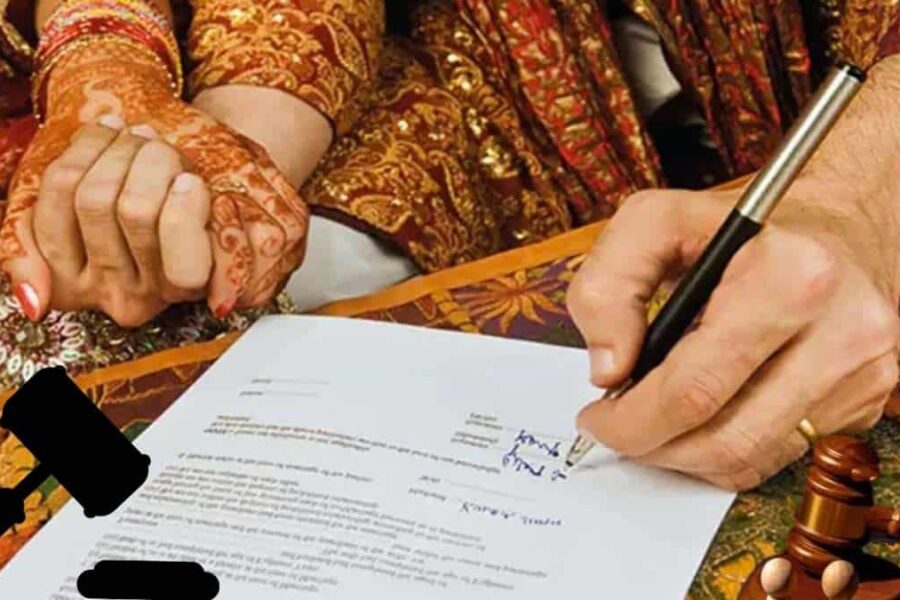A court marriage can occur or be solemnized within the court itself within the presence of a wedding Officer and three witnesses. this sort of marriage doesn’t should necessarily include the frilly customary or ritualistic steps of the private laws of the parties to the wedding. Merely marrying within the presence of a wedding officer in accordance with the act is sufficient for a legitimate marriage.
Court marriages are solemnized under the Special Marriage Act, 1954. Court marriage is performed between an Indian male and a female regardless of their caste, religion or creed. It may also be solemnized between an Indian and a foreigner. The procedure of the Court marriages does away with the rituals and ceremonies of the normal marriages. The parties can directly apply to the wedding Registrar for performance & registration of marriage and grant of marriage certificate.
Steps involved during a court marriage in India
1. Information about the intention to induce married
The first step of the procedure of court marriage is to notify the wedding officer of the district about your intention to marry. One can do that by filling up the court marriage form (which is mentioned in Schedule II of the Special Marriage Act, 1954). this may even be downloaded from the net. One has got to submit this kind 30 days before the date of the wedding to the officer of the district where either of the partners resides.
2. Display of the Notice
After being informed, the district marriage registrar displays the notice at a prominent place at his office for 30 days. Within this era, anyone can object to the wedding if they deem it to be illegal under the Act and eligibility conditions prescribed thereunder. Section 7 of the Special Marriage Act states that somebody whose has an objection to the wedding intended can raise the objection within 30 days from the publication of the notice. Once any such objection is received, the wedding registrar verifies the validity of the identical. On being reasonably satisfied with the validity of the objection, the registrar will end the court marriage process therein. In such cases, the partners may appeal to the concerned district court, against the order of the wedding registrar. If there’s no valid objection, the officer can proceed with the procedure of court marriage, as per the court marriage rules.
3. Marriage Day
The bride, groom, and three witnesses need to sign a declaration form within the presence of the wedding registrar or at a location that’s reasonably near the registrar’s office (as mentioned in Section 12 of the Special Marriage Act). The declaration needs to state that the parties are proceeding with the court marriage, with consent.
4. Issuance of Court marriage certificate
If all the formalities are completed, the wedding registrar specifies the main points of the court marriage within the court marriage certificate. this can be as per provisions mentioned in Schedule IV of the Special Marriage Act. The certificate is issued within 15 to 30 days.
The court marriage fees for registration
The court marriage fees differ from state to state. Every state has the freedom to border its own court marriage rules and regulations. Accordingly, the court marriage fees structure also differentiates between states. Therefore, it’s advised to partners who are becoming married to test the appliance fee and other fees associated with the procedure of court marriage, before going ahead with the net application of a court marriage certificate.
Usually, the court marriage fees for application are Rs.100 under the Hindu Marriage Act and Rs.150 under the Special Marriage Act. apart from this, there are some administrative and other charges one may must incur. The fee to be paid to your court marriage lawyer would rely upon the sort of case the lawyer is handling and therefore the reputation of the lawyer. a simple case is commonly cheaper.
Documents required for a court marriage in India:
- Application form (notice within the form specified) duly filled and signed by both the groom and bride.
- Documentary evidence of the date of birth of both the parties (matriculation certificate/ passport/ birth certificate)
- Receipt of fees paid with reference to the applying form within the District Court
- Documentary evidence regarding stay in Delhi or any state of 1 of the parties for quite 30 days (ration card or report from the concerned police station Officer).
- Separate affidavits from bride and groom giving- date of birth, present legal status (unmarried/widower/ divorcee).
- Affirmation that the parties aren’t associated with one another within the degree of prohibited relationship defined within the Special Marriage Act.
- Passport size photographs of both parties (2 copies each) duly attested by a gazette officer.
Written by Adv Rohit Yadav

